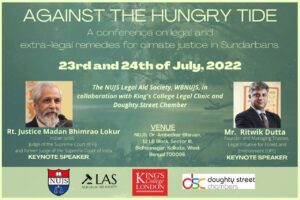As we speak, the people of South Asia are seeing unprecedented floods, heatwaves and cyclonic activity attributed to global warming. The inhabitants of the Sundarbans, the deltaic area straddling India and Bangladesh, and the largest mangrove forest in the world, have been exposed to such climate-induced phenomena for decades, leading to loss of livelihood, migration, forced labour, debt, and gender-based human rights violations amongst others. What are the vulnerabilities of those on the margins of global society, but at the centre of its global warming? What are the learnings from their experiences? How can there be an effective response to the crisis of the inhabitants of the Sundarbans, and what role can law play in that? Ultimately, for those who have least contributed to global warming, how can they obtain substantive transnational justice?
These questions, and others, will be posed at a two-day conference to be held at the National University of Juridical Sciences (NUJS), entitled ‘Against the Hungry Tide-How do those affected by global warming get justice?’ to be held on the 23rd and 24th July 2022. The conference is part of an innovative, multi-disciplinary partnership, between NUJS, King’s College London (KCL) Human Rights and Environment Law Clinic, Doughty Street Chambers, and Jadavpur University. The partnership has already seen baseline surveys of those affected by global warming in the Indian Sundarbans, research into potential legal complaints, and the creation of a network of those researching and working on Sundarbans issues.
The core concept of both the partnership and the conference, is the participation of those who are affected, researchers and activists in the field. Each of the sessions is intended to highlight their learnings and views on how this grassroots knowledge can be integrated into avenues for redress and remedy. The sessions include:
1. Refugees of Paradise Lost: An exploration of the cross-sectional vulnerabilities of the inhabitants of the Sundarbans.
2. Nowhere to go: Narratives of Conflict and Adaptation in the Sundarbans.
3. Challenges to remedy in the Sundarbans.
4. Transnational judicial and non-judicial avenues for redress and remedy in the Sundarbans.
The conference will also launch an exciting collaborative LLM course, entitled Transnational Remedies for Environmental Harm with Clinical Legal Education, between KCL, NUJS and Jindal Global Law School, with exploratory grant funding from the British Council, due to begin in January 2023. Along with the partnership, the LLM is believed to be first of its kind, focussing on transnational environmental law remedies, with a focus on empowering young lawyers to approach environmental problems from a multi-disciplinary, national and transnational perspective.
We are particularly grateful to have former Indian Supreme Court Judge and Judge of the Fiji Supreme Court, Justice Madan Lokur, and Ritwick Dutta, founder of Legal Initiative for Forest and Environment (LIFE), who will deliver the keynote addresses.

